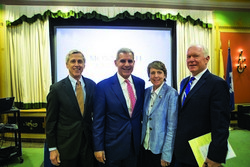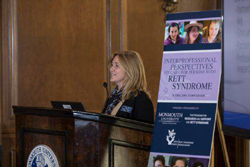The Office of the President and Department of Political Science and Analogy hosted the final Public Servant in Residence Panel of this year discussing ocean protection and climate change. The panel was moderated by former state Senator Joseph Kyrillos, in Wilson Hall on Friday, April 5.
“When I was first elected to the state Legislature, there was a true crisis out there,” said Kyrillos, discussing the condition of New Jersey’s beaches.
Kyrillos continued, “However, a rare collective effort among government, along with the help of non-governmental groups pushing for change, managed to turn the table.”
He explained that shortly after, the beaches were clear of garbage and filled with people again.
While his time in the legislature, Kyrillos established New Jersey’s Shore Protection Fund, sponsored the original Environmental Infrastructure Trust, and helped close the – Coastal Area Facilities Review Act (CAFRA) loophole to protect the shoreline from overdevelopment.
“Lawmakers ended ocean dumping and curbed inappropriate development along the shore and among other steps,” he said.
The panel also featured the following speakers: Tony MacDonald, Director of Monmouth University’s Urban Coast Institute (UCI); Cindy Zipf, Executive Director of Clean Ocean Action, a broad-based coalition of non-profit agency that researches pollution issues affecting the marine environment, then formulates policy and campaigns to eliminate each pollution source; Chris Daggett, Former Regional U.S. Administrator of the Environmental Protection Agency and Commissioner of the New Jersey Department of Environmental Education.
Daggett had an up-close view of what the state faced first as a regional administrator under the administration of former New Jersey Governor Thomas Kean.
“To say that it was the Wild West was not far from the truth in a lot of different areas. Everything from wood to hypodermic needles was being discovered. Debris washing up on the shore and high fecal coliform levels found in water samples forced the closure of beaches,” said Daggett.
He explained that New York harbors filled with debris came from sources noticing uncovered trash bags entering the ocean. To fix the issue, New York City covered barges and began street sweeping. “Overtime, other steps were put in place, so that you can suddenly see your feet in the water in the ocean,’ “he said.
Zipf recalled that New Jersey was the ocean dumping capitol of the world where there were eight ocean dumping areas for dredge spoils, wood burning, and other material.
“There were legal areas that were managed by the government for dumping waste. Overtime, the ocean had enough with medical waste and dead sea life washing up on shore and the state tourism industry. We were a national laughingstock,” said Zipf.
Throughout the Jersey Shore, including Monmouth, Ocean, Atlantic, and Cape May County, a minimum of 9 percent are part of our identity,” said Kyrillos.
MacDonald described that it would be unthinkable of NJ’s progress 30 years ago, but he believes there will be future issues due to the ocean’s chemistry evolution.
“Due to ocean warning, fishermen are noticing a shift in typical fishing patterns. The regular framework for fish management is not adaptable to this kind of changes,” said MacDonald.
“We still have obstacles to face and challenges to deal with. Climate change is a real issue that can negatively impact all of our communities,” said Kyrillos.
Zipf believes that the public is valuable when advocating for issues to influence movements.
“It is true that elected leaders and government can obviously make things happen, but they need, we the people, to push them. We need academia to do research and critical thinking to come up with solutions to put this together,” said Zipf.
Paul Dement, the University’s Director of Government and Community Relations, said, “I want to thank Senator Kyrillos for being with us this year and providing such informative discussions for our students and the community.”
“It’s really been a terrific year and it was because of the dedication and work that Senator Kyrillos put in to make these events successful,” he concluded.
PHOTO COURTESY of Monmouth University



